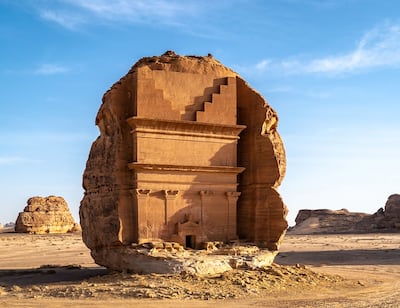As the Unesco World Heritage Committee continues in Riyadh, experts in AlUla have been discussing the difficult balance between international collaboration in archaeology and avoiding cultural bias.
During a panel session at the inaugural AlUla World Archaeology Summit, Khaled Melliti, a historian with France's National Centre for Scientific Research, said: “Archaeologists should think of their own identities as well as those of the sites they are excavating or studying.”
Emanuelle Papi, director of the Italian School of Archaeology in Athens, added that contemporary archaeologists have tended to view the past through “the eyes of their own time”. He offered the example of the historical importance given to Rome’s Imperial era, seen as the cornerstone of Italian national identity. As a result, he said, archaeologists would overlook precious relics from the Middle Ages and Byzantine and Renaissance eras during excavations of Roman ruins.

Melliti cited another example, where after the 2010-2011 uprising, archaeologists “discovered the existence of a republic beneath the Tunisian soil”.
In light of inherent cultural biases, panellists highlighted the importance of working with local communities. Maritime archaeologist Lucy Semaan said she always talks to local fishermen to find out more about the local fish and aquatic zones – an approach that can be broadened out to other archaeological projects.
Robert Hoyland, professor of Late Antique and Early Islamic Middle Eastern History at New York University, recounted how during his first archaeological expedition in Syria, he told a local shopkeeper that he was working on a Roman town. The shopkeeper replied: “No, you’re excavating an Arab town of the Roman period.”
Organised by the Royal Commission for AlUla, the summit has seen more than 300 delegates travel to north-west Saudi Arabia from 39 countries to discuss how to promote archaeology on a global level.

During the event, RCU chief executive Amr AlMadani reiterated AlUla’s commitment to sustainable tourism. “Our project isn’t about leveraging heritage to attract visitors. It’s about leveraging visitors to sustain heritage,” AlMadani said.
During the event, the commission signed an agreement with Saudi Arabia’s Antiquities Association to promote research and community participation in antiquities and cultural heritage. The agreement, signed by Abdulrahman Alsuhaibani, executive director of archaeology, conservation, and collections at RCU, and Hassa AlSudairy, chief executive of the Antiquities Association, makes RCU the association’s first official partner.
Both parties will commit to training Saudi archaeologists, encourage participation from residents and visitors, support research and introduce digital measures to enhance antiquities.
Alsuhaibani said: “It is appropriate that this agreement is signed at the inaugural AlUla World Archaeology Summit, a leading platform for leveraging archaeology to benefit the broader society.
“We look forward to pursuing innovation, digitalisation, and community engagement with the Antiquities Association,” he added.
AlSudairy said: “Having been trained in archaeology myself, and having visited AlUla many times, it is an honour to have RCU as the first official partner of the Antiquities Association.
“The association is focused on digitalisation, sharing research knowledge, and nurturing the young women and men who are the future of Saudi archaeology – and the agreement with RCU furthers all those objectives.”


